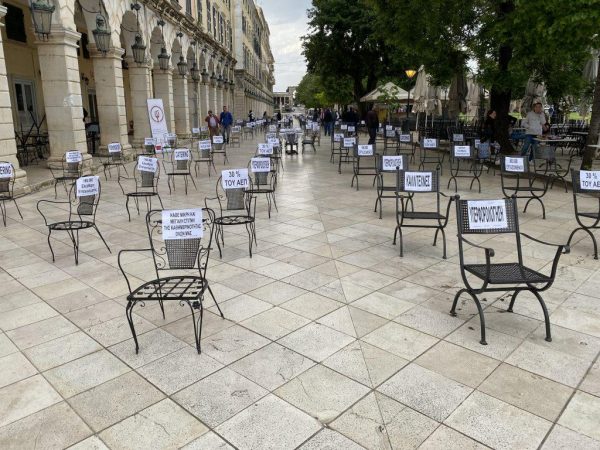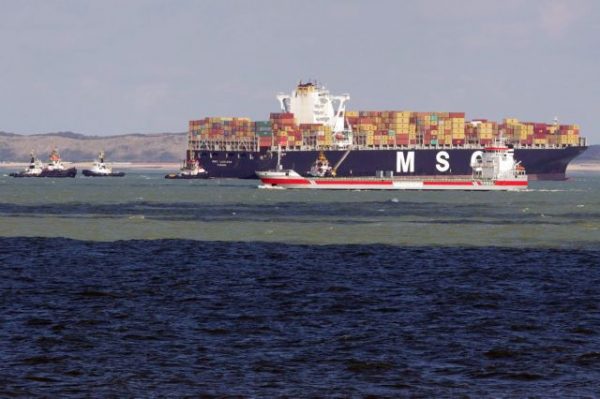
The losses of the food service/catering industry from last year’s first lockdown until May 3, when the tables will again be set tops 2.5 billion euros, according to ELSTAT (Hellenic Statistical Authority) data.
In the 182 days of the last lockdown – it is noted that the suspension of the food service industry, excluding delivery and take-away services, has been imposed since November 3, 2020 throughout the country – the lost turnover is estimated at 0.5 billion euros according to the data of the statistical service.
In fact, the blow is much greater, as the data do not apply to all companies, but only those who are required to keep books and are the only ones who submit data on their turnover on a monthly basis.
Based on estimates of financial analysts and market players, it is estimated that in 2020 a total turnover of about 4 billion euros was lost. To this amount should be added the losses of the first 4 months of this year, a period when all stores in the food service sector were closed by government order, with the exception of course of delivery and take-away services.
For the 4 months from November 2020 to February 2021, for which period ELSTAT has published data, the losses in the turnover of companies in the food service industry with the obligation to keep books exceed 283 million euros.

For 9 out of 10 the situation worsened
Representative of what is happening is the latest research of FHW GSEVEE for the semester conducted in orderto capture the economic climate in small and very small enterprises.
Nine out of ten food service companies (91.2%) stated that their situation deteriorated in the second half of 2020. This figure shows the particularly unfavorable situation in which the industry has found itself due to the prolonged period in which most of it is under suspension mode.
Equally gloomy is the picture of liquidity for the sector, as 44.1% have no cash at all, while for 19.2% they have just enough for a maximum of one month.

Losses in Attica, Thessaloniki, Mykonos, Santorini, Corfu, Kos and Heraklion at 1.7 billion euros
It is characteristic that in Attica, Thessaloniki and the popular tourist destinations, such as Mykonos, Santorini, Corfu, Kos and Heraklion in Crete, the companies in the food service sector lost about 1.7 billion euros, in 2020.
In the region of Attica the losses exceeded 950 million euros, while in Thessaloniki they topped 410 million euros, always according to ELSTAT.
Among the tourist areas, the biggest losses were recorded by the market of Mykonos. According to ELSTAT, the turnover of the 264 companies in the food service sector operating on the “island of winds” showed losses of 84 million euros (a decrease of 73.3%).
The 747 companies in the sector in Santorini lost 93 million euros (-71%).
In Corfu, the 2,031 companies in the food/catering services sector lost 62 million euros (-50.9%).
The 752 companies in the catering sector in Kos lost 27 million euros in 2020 compared to 2019 (-55.9%), while the 2,710 companies in the same sector in Heraklion, Crete lost a turnover of 60 million euros (-37 , 9%).
The slide continued in 2021 as well
This January cost restaurants more than 71 million euros.
Specifically, according to ELSTAT data, the turnover of companies in the catering services sector with the obligation to keep bibliographic books, for which data are available on a monthly basis, in January 2021 amounted to 53,128,124 euros, recording a decrease of 57.2% compared to January 2020, where it had reached 124,225,697 euros.
For the companies of the Regional Units with a contribution to the total turnover in 2020 greater than 1%, the largest decrease was observed in the Regional Unit of Thira (92.8%) and the smallest decrease was recorded in the Regional Unit of Halkidiki (21.1%).
Things were similar for February, with losses reaching 64 million euros.
Specifically, based on ELSTAT data, food service enterprises with the obligation to keep books, for which data are available on a monthly basis, the turnover in February 2021 amounted to 51,672,826 euros, recording a decrease of 55.4% compared to February 2020, when it had risen to 115,729,873 euros.
For the companies of the Regional Units with a contribution to the total turnover of the year 2020 greater than 1.0%, the biggest decrease in turnover in February 2021 compared to February 2020 was observed in the Regional Unit of Magnesia (87.0%) and the smallest decrease was recorded in the Regional Unit of Evia (23.8%). 
Support measures
On 1 April the Ministry of Development announced an additional € 330 million aid package for the catering sector, however the application platform has not yet opened.
The support will be in the form of working capital for the first 2-3 months of the reopening of the restaurants, while the Ministry of Finance has left open the possibility for further support.
This action is financed through the Operational Program “Competitiveness – Entrepreneurship – Innovation” of the PA (Partnership Agreement for the Development Framework) 2021 – 2027 and concerns SMEs as well as large companies, which have a main profession code or their profession code shows its highest revenue from food service.
Beneficiaries also include franchise companies, provided that certain PA regulatory criteria are met. The maximum amount of aid is set at 100,000 euros per company tax registration number.
The criteria for benefitting from the action are:
– Reduction of annual turnover 2020 compared to 2019 greater than or equal to 30%.
– For companies established in 2019 for the fall in turnover, an equal number of operating days is calculated.
– Those established in 2020 are automatically entered intothe action.
– Food service companies that were under construction in 2019 and started to have revenue in 2020 are treated as established within 2020.
– Catering companies that are obliged to submit periodic VAT returns.
Latest News

Greece Defines Continental Shelf Limits and Maritime Zones in Landmark EU Document
The Maritime Spatial Planning (MSP) framework represents a comprehensive approach to spatial planning and is crucial for the successful development of a blue and circular economy

EU Praises Greece’s RRF Progress as Revised Recovery Plan Nears Completion
Athens is preparing to submit its revised “Greece 2.0” Recovery and Resilience Plan after Easter, with a slight delay from the initial timeline but with the European Commission’s approval.

Greek €200M 10Y Bond to be Issued on April 16
The 3.875% fixed-interest-rate bond matures on March 12, 2029, and will be issued in dematerialized form. According to PDMA, the goal of the re-issuance is to meet investor demand and to enhance liquidity in the secondary bond market.

German Ambassador to Greece Talks Ukraine, Rise of Far Right & Tariffs at Delphi Economic Forum X
Commenting on the political developments in his country, the German Ambassador stressed that it was clear the rapid formation of a new government was imperative, as the expectations across Europe showed.

Athens to Return Confiscated License Plates Ahead of Easter Holiday
Cases involving court orders will also be excluded from this measure.

Servicers: How More Properties Could Enter the Greek Market
Buying or renting a home is out of reach for many in Greece. Servicers propose faster processes and incentives to boost property supply and ease the housing crisis.

Greek Easter 2025: Price Hikes on Lamb, Eggs & Sweets
According to the Greek Consumers’ Institute, hosting an Easter dinner for eight now costs approximately €361.95 — an increase of €11 compared to 2024.

FM Gerapetritis Calls for Unified EU Response to Global Crises at EU Council
"Europe is navigating through unprecedented crises — wars, humanitarian disasters, climate emergencies," he stated.

Holy Week Store Hours in Greece
Retail stores across Greece are now operating on extended holiday hours for Holy Week, following their Sunday opening on April 13. The move aims to accommodate consumers ahead of Easter, but merchants remain cautious amid sluggish market activity.

Green Getaway Ideas for Easter 2025 in Greece
Celebrate Easter 2025 in Greece the sustainable way with eco-farms, car-free islands, and family-friendly getaways rooted in nature and tradition.








































 Αριθμός Πιστοποίησης
Αριθμός Πιστοποίησης